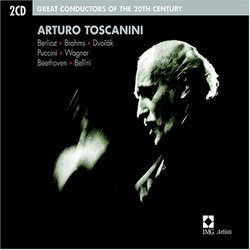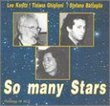| All Artists: NBC Symphony Orchestra, BBC Symphony Orchestra Title: Great Conductors of the 20th Century: Arturo Toscanini Members Wishing: 1 Total Copies: 0 Label: EMI Classics Release Date: 7/27/2004 Genre: Classical Styles: Opera & Classical Vocal, Forms & Genres, Theatrical, Incidental & Program Music, Historical Periods, Classical (c.1770-1830), Symphonies Number of Discs: 2 SwapaCD Credits: 2 UPC: 724356293922 |
Search - NBC Symphony Orchestra, BBC Symphony Orchestra :: Great Conductors of the 20th Century: Arturo Toscanini
 | NBC Symphony Orchestra, BBC Symphony Orchestra Great Conductors of the 20th Century: Arturo Toscanini Genre: Classical
|
Larger Image |
CD DetailsSimilar CDs
|
CD ReviewsA worthy testimony to a legend, despite the antique sonics Santa Fe Listener | Santa Fe, NM USA | 05/21/2006 (5 out of 5 stars) "It was unthinkable when I was young that anyone but Toscanini could be synonymous with "maestro," but evolving technology and changing tastes have dimmed his supreme reputation. The rise of Bernstein and Karajan brought new glamur to the podium, and the resurrection of Furtwangler from post-Nazi neglect gave us a musician whose inspiration exceeded Toscanini's. Now, even though the bulk of his recordings are still available, Toscanini stands in the front rank of great historical figures rather than among those whose musicmaking sitll feels fully alive (this is only a gneralization; there are some Toscanini performances that will thrill listeners forever).
This installment in the Great Conductors of the Century series does Toscanini full justice, I think. We hear the passion and razor-sharp precision that so astonished early audiences, but also the tendency to be too strict with the beat, too heated and rushed in phrasing. The highlight of this 2-CD colleciton is a live 1948 Brahms Fourth that collectors consider to be first choice among Toscanini's NBC peformances. I am not a collector, but this reading, despite the expected cramaped, boxy mono sound, is flexible, precise, and clean. Toscanini's Brahms was never musty, and since he actually played for the composer, one feels a strong continuity with the past. The big work on CD 2 is a familiar Beethhoven Pastorale with the BBC Sym., less hard-driving than his NBC remake but in antique sound, especially annoying since the first oboe is front and center, drowning out half the orchestra. The 1941 Immolation scene with Helen Traubel has good radio sound for its day, with the soloist placed close to the mike. She is stalwart and secure, and Toscanini accompanies with his customary intensity and refusal to revere Wagner. The Francs-Juges Over. is given another alert, lithe performance that shows off Toscanini's approach to Berlioz, rather in the vein of Rossini. Despite the complaints of the reviewer below, these are good-enough transfers, but they fall short of RCA's almost miraculous remastering in their latest Toscanini the Immortal series." |

 Track Listings (7) - Disc #1
Track Listings (7) - Disc #1
